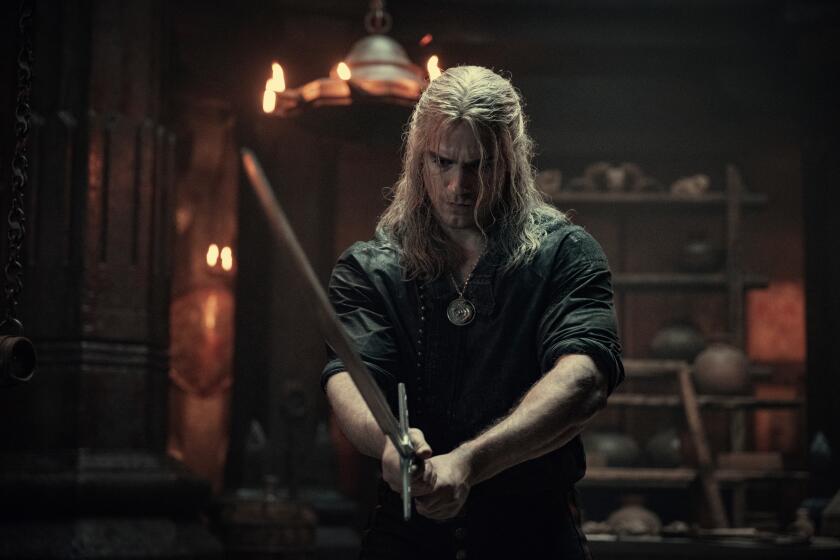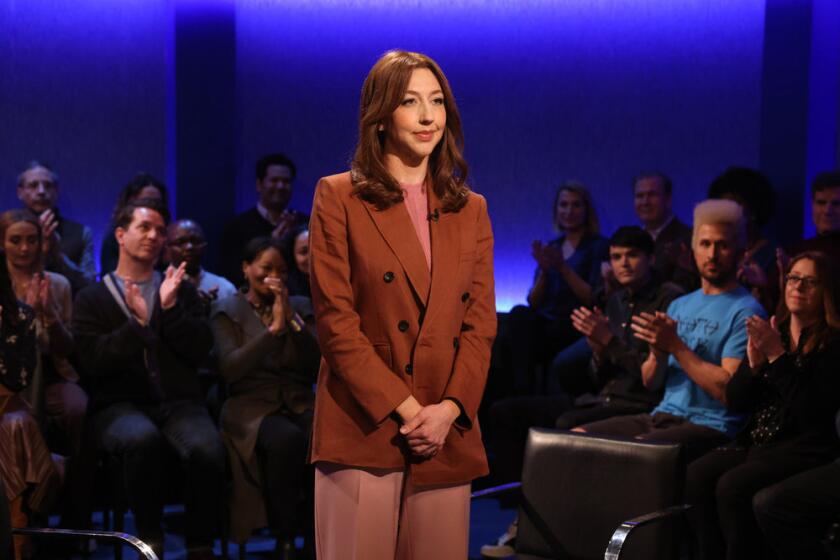Midseason Television preview: ‘The Sunset Limited’
If Cormac McCarthy has a mantra, it’s ask questions first, shoot later. His bloody, rifle-toting, border-crossing novels such as “No Country for Old Men” and “The Road” have pondered the great mysteries, including: Is human nature ultimately good or evil? And: What’s the least messy way to explode a man’s skull with a cattle stun gun?
McCarthy’s 2006 play, “The Sunset Limited,” which airs on HBO in February in a production directed by Tommy Lee Jones, might be his most aggressive inquisition. The title comes from the real-life train that runs across the southern part of the country — a one-way ticket west into the sunset, with all the mortal weight that journey implies. The whole play takes place at a dinner table, where a white professor (Jones) who tried to commit suicide by throwing himself in front of a train is locked in a heated debate with the black ex-con ( Samuel L. Jackson) who saved him, dragged him back to his kitchen and tries to talk him out of another suicide attempt. Among the issues they’re discussing: Is there a compelling reason to believe in God? What’s the difference between a true believer and a sinner who’s just looking for redemption? Are the answers to those questions even important if they can’t keep a man on the platform when the Sunset Limited is speeding toward him?
Sitting at HBO’s offices in Manhattan, looking serious in his long black trench coat, Jones recalls what drew him to “The Sunset Limited,” which was first produced by Chicago’s Steppenwolf Theatre in 2006. (McCarthy, who rarely does interviews, wasn’t available for comment.) Jones, who has known McCarthy for years, meeting through a mutual friend, “Lonesome Dove” screenwriter Bill Wittliff, says the play reminded him of discussions he used to have with other students when he was at Harvard. “We’d sit around for hours talking about things like, is the theater really dead? Is Big Ten football better than Southwest Conference? What is the effect of television on the office of the presidency?” says Jones. “You’re more open when you’re younger.”
He pauses, looking out the window. “I don’t talk to anybody like that now,” he says, his voice a little colder. “I know what I think, and I expect that you know what you think. I’m not gonna argue with you.”
Watching “The Sunset Limited,” it’s easy to wonder whether anyone’s mind can ever really be changed. The script refers to its characters only as Black and White, as if their conversation were a verbal chess game with no checkmate in sight.
“It’s a classical dialectic,” Jones explains, referring to the dramatic form used by Plato and Socrates to illustrate two opposing worldviews. “The first two lines of the play speak volumes. Black says, ‘What am I supposed to do with you, Professor?’ and White says, ‘Why are you supposed to do anything?’ There’s very strong currents of human thought running through that two-line exchange. One guy says, ‘What is the right thing to do?’ And the other says, ‘Take action? There’s only one action that would have any meaning, and that’s to jump in front of a train.’”
In the play, each man’s race clearly shapes his worldview — and McCarthy doesn’t seem to care much about challenging stereotypes. Black is a Southern preacher. White is a WASP-y, Ivy League academic. Still, McCarthy does his best to complicate the metaphorical implications of both colors: Black is the one telling White that “the light is all around you, ‘cept you don’t see nothin’ but shadow,” while White calls himself “the professor of darkness.”
“Cormac wrote them as ethnic characters,” Jackson says over the phone from Los Angeles. “We come from a very spiritual place as African people. If you go back through the Saxons and the Celts, there was belief there too, but they also wanted to believe they were in charge of their own fate.”
Strange, then, that both Jackson and Jones say they identify more with Black than White. Jackson says the first thing he does every morning is pray — though he doesn’t go to church as much as his wife would like him to. Jones stopped going to church long ago, though he still respects the Southern Baptist religion in which he was raised. Besides, he says, “I don’t like White very much. I get tired of the argument for self-destruction.”
Perhaps McCarthy does too. His own relationship with faith has changed radically over the years. In books such as “Blood Meridian” and “No Country for Old Men,” he suggests that evil is random and reasonless and way more cool than good. But many critics have read his most recent book, “The Road,” as a Christian parable: It follows a father and son as they try to remain righteous in a post-apocalyptic world. When Oprah Winfrey asked McCarthy if “The Road” had helped him work out “the whole God thing,” he replied, “I don’t think you have to have a great idea of who or what God is in order to pray.”
Perhaps “The Sunset Limited” is that type of prayer — the kind you send out to God, who probably won’t answer. By the end of the play, it’s unclear whether White has challenged Black in the same faith-affirming way that Job was tested in the Bible, or whether he’s completely broken Black down, convincing him that “the darker picture [of the world] is always the correct one.”
For Jackson, there’s no question what happens. “The ending is an argument to say never give up hope,” he insists. “People will find a glimmer of light in there somewhere.”
Jones is not so optimistic. “You want to know, does goodness or evil win?” he says, grinning in a way that’s not exactly friendly. “Well, it’s not about good or evil. The truth wins out in the end.”
The complete guide to home viewing
Get Screen Gab for everything about the TV shows and streaming movies everyone’s talking about.
You may occasionally receive promotional content from the Los Angeles Times.



